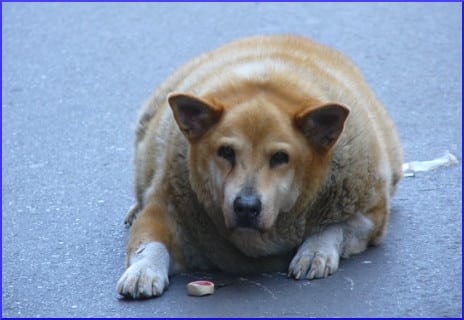
Yesterday, Childhood Obesity News listed several ways in which children and pets resemble each other or, more accurately, ways in which child-parents and pet-parents are similar in their misguidedness.
There is one more major similarity: co-morbidities. These are medical conditions that are risk factors for obesity, or for which obesity is a risk factor, or that just happen to co-exist because a careless diet exacerbates both of them. Pets are just like children in this respect, because pet obesity is often related to one or more of several related disease processes.
Complete details can be found in “Similarities between obesity in pets and children: the addiction model,” by Dr. Robert A. Pretlow and Dr. Ronald J. Corbee, which appears in the British Journal of Nutrition. It begins to look as if the primary cause for obesity in both populations is parental co-dependency, which manifests as the attempt to buy affection with food. Similar to human parents, pet-parents tend to hand out treats and extra rations of food in the belief (justified or not) that the result will be more love.
A website called Pet Expertise delivers the surprising information that there are four different categories of treats. Even mundane kibble can be used, especially with puppies who are not yet aware that a training treat is supposed to be somewhat exotic. The trick is to keep kibble nuggets in a paper bag with some cooked bacon, soaking up the porky perfume.
“People food” will also work. Fresh meat or eggs can be dried out a bit in a microwave oven. Or gravy can be dispensed via a liquid treat dispenser. Then, there are store-bought treats — especially the brand sold by the informational website. For pet-parents who are all in, who really want to go the whole nine yards, there are recipes for tuna brownies (sprinkled with parmesan cheese) and turkey treats, basically meat loaf cut into strips.
The question for a pet-parent is, do you really want to spend your life making tuna brownies for a half-trained animal that becomes increasingly demanding?
Not everything that can be done, should be done
A cat will cause amazement by doing a trick 12 times in a row, and then disdain to repeat the trick ever again on any other day of its life. In other words, they are pretty much untrainable, so we are mainly talking about dogs here. In the realm of training, cats are immune to positive reinforcement. While a cat will remain aloof and indifferent no matter how many food treats are showered on it, a dog is going to love its human anyway, even in the face of mistreatment.
This is why bribing a dog with treats is almost perverse, because it is so unnecessary, when a dog can be taught to find positive reinforcement in praise, petting, and play. Giving a dog food treats is almost an abuse of the animal’s natural wish to please.
Apparently, one of the big problems encountered by pet-parents is that dogs blur the line between rewards and bribes. It is vital to “teach the dog the important lesson that he must successfully do the work before you’re willing to dole out the reward.”
Diversification is the best course. The Association of Professional Dog Trainers says:
[U]se something else he’s telling you he wants — like his leash put on to go for a walk, his favorite toy to be thrown, or an invitation to join you on the couch for snuggle time. By using these types of “life rewards,” you’re teaching your dog that keeping you happy by complying with your requests is the key to opening the door to everything good in his world — not just food treats!
Kevin Salem, champion of the “Diverse Method,” presents an astonishing list of 17 reasons why the food treat training method is wrong. For starters, while a dog’s love can be gained by giving it treats just for being alive, love is only a small part of the picture.
What’s needed for proper training is respect, which can not be bought with food. Salem writes:
Contrary to popular belief, relying heavily on treats gets you quick, but short-lived results. Not thousands, but millions around the world have fallen for this theory. Would you rather train your dog by your Praise, Leadership, Technique and Psychology or bribe it nonstop with cheese, hot dogs, bacon strips and beef jerky?
Some pet-parents will even give a dog a reward treat after a walk, which is crazy. The walk is the reward! For a dog, the biggest reward of all is gaining the approval of the pack leader — which is you, having mastered the secrets of praise, leadership, technique and psychology, and having given up the pathetic strategy of trading food for love.
Your responses and feedback are welcome!
Source: “Similarities between obesity in pets and children: the addiction model,” Cambridge.org, 06/17/16
Source: “4 Kinds of Dog Training Treats,” PetExpertise.com, undated
Source: “Why Do Trainers Use Food When Training?,” APDT.com, undated
Source: “Biggest Scam in Modern Dog Training,” DogSecrets.com, undated
Photo credit: Mr TGT via Visualhunt/CC BY-ND

 FAQs and Media Requests:
FAQs and Media Requests: 











